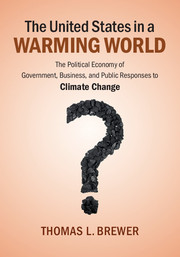 The United States in a Warming World
The United States in a Warming World Book contents
References
Published online by Cambridge University Press: 05 October 2014
- Type
- Chapter
- Information
- The United States in a Warming WorldThe Political Economy of Government, Business, and Public Responses to Climate Change, pp. 300 - 339Publisher: Cambridge University PressPrint publication year: 2014
